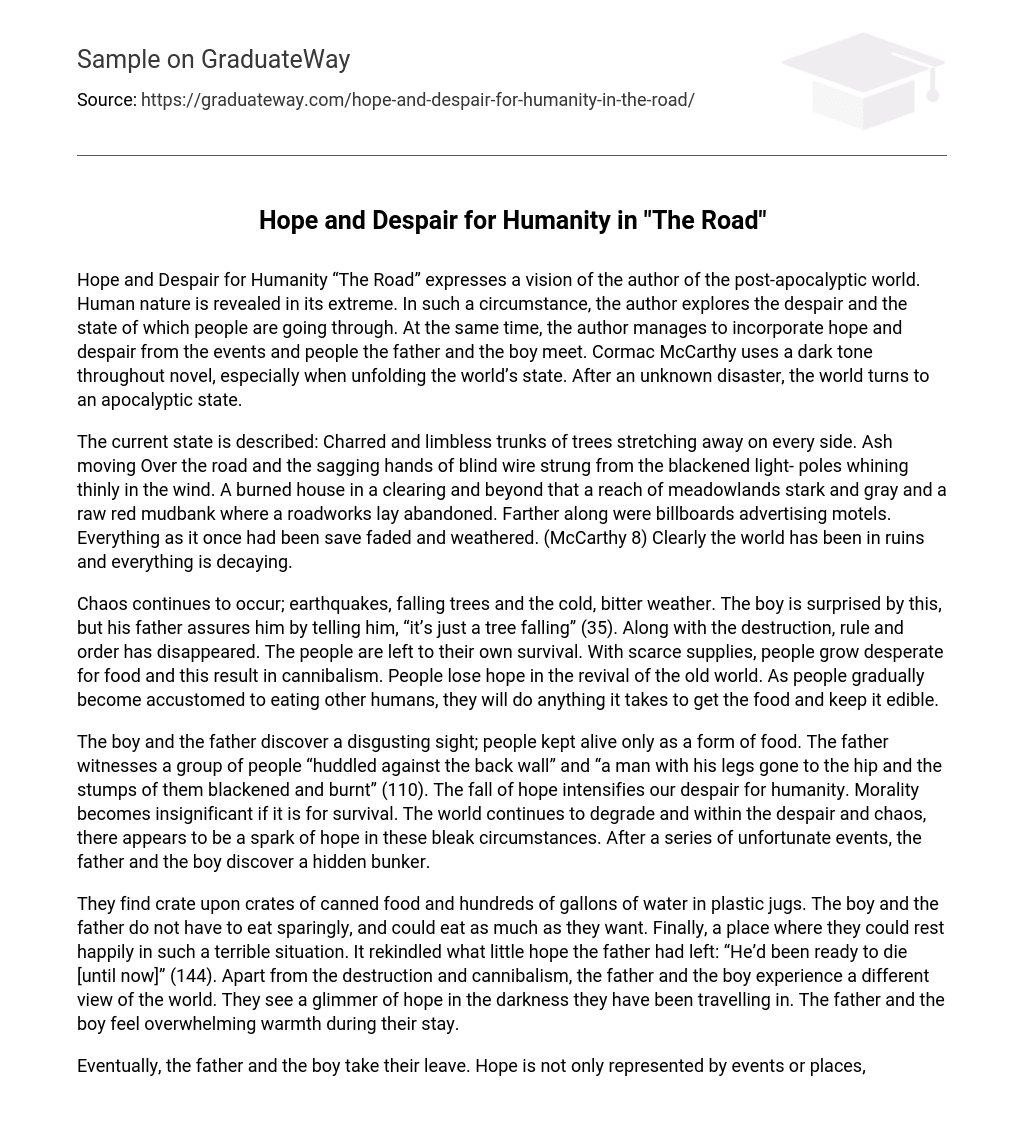Hope and Despair for Humanity “The Road” expresses a vision of the author of the post-apocalyptic world. Human nature is revealed in its extreme. In such a circumstance, the author explores the despair and the state of which people are going through. At the same time, the author manages to incorporate hope and despair from the events and people the father and the boy meet. Cormac McCarthy uses a dark tone throughout novel, especially when unfolding the world’s state. After an unknown disaster, the world turns to an apocalyptic state.
The current state is described: Charred and limbless trunks of trees stretching away on every side. Ash moving Over the road and the sagging hands of blind wire strung from the blackened light- poles whining thinly in the wind. A burned house in a clearing and beyond that a reach of meadowlands stark and gray and a raw red mudbank where a roadworks lay abandoned. Farther along were billboards advertising motels. Everything as it once had been save faded and weathered. (McCarthy 8) Clearly the world has been in ruins and everything is decaying.
Chaos continues to occur; earthquakes, falling trees and the cold, bitter weather. The boy is surprised by this, but his father assures him by telling him, “it’s just a tree falling” (35). Along with the destruction, rule and order has disappeared. The people are left to their own survival. With scarce supplies, people grow desperate for food and this result in cannibalism. People lose hope in the revival of the old world. As people gradually become accustomed to eating other humans, they will do anything it takes to get the food and keep it edible.
The boy and the father discover a disgusting sight; people kept alive only as a form of food. The father witnesses a group of people “huddled against the back wall” and “a man with his legs gone to the hip and the stumps of them blackened and burnt” (110). The fall of hope intensifies our despair for humanity. Morality becomes insignificant if it is for survival. The world continues to degrade and within the despair and chaos, there appears to be a spark of hope in these bleak circumstances. After a series of unfortunate events, the father and the boy discover a hidden bunker.
They find crate upon crates of canned food and hundreds of gallons of water in plastic jugs. The boy and the father do not have to eat sparingly, and could eat as much as they want. Finally, a place where they could rest happily in such a terrible situation. It rekindled what little hope the father had left: “He’d been ready to die [until now]” (144). Apart from the destruction and cannibalism, the father and the boy experience a different view of the world. They see a glimmer of hope in the darkness they have been travelling in. The father and the boy feel overwhelming warmth during their stay.
Eventually, the father and the boy take their leave. Hope is not only represented by events or places, but in people as well. In the novel, the boy is very persistent about being the “good guys” and “carrying the fire. ” The fire represents hope to the boy, and he intends to carry it with his father. Despite the circumstances, the boy has the will to help others in need. Initially, when the father and the boy encounter an old crippled man, the boy wants to help. The boy asks his father, “Cant we help him papa? ” His father replies with “No. We cant help him. There’s nothing to be done for him” (50).
The father decides that nothing can be done and continue the journey, with the boy in tears. The boy wants to help an unknown man, even if it meant sacrificing their own food. An opportunity arises for the boy to help another old man. After their visit to the bunker, the boy helps an old man, named Ely. The father did not want to sacrifice food for an unknown man, but is forced to due to the boy’s persistence. Together, they share food and have a conversation. Coincidently, Ely says, “When I saw that boy I thought that I had died” (72). Ely sees that the boy is the hope, leftover from this catastrophic world.
The boy shows more than kindness when they meet the thief who steals everything they have. The father tracks the thief, and in revenge, demands that he be stripped of everything. Once they leave the man, naked in the cold weather, the father and the boy get in a heated argument. The father says, “You’re not the one who has to worry about everything” (259). The boy replies, “I am the one. ” (259). The father, once again, gives in to the boy’s persistence. They could not find him, but they still return his clothes and a can of food. The boy is pure and kind, even to those who have sinned.
McCarthy represents hope in the boy. The boy follows a path of righteousness and has pure intentions. The novel shows how humans can be vicious, and they can degrade to the nascent level where they can turn to cannibalism when survival is in question. McCarthy uses an unstructured writing and a melancholy nature to further express the state the people and the world. Yet, there is hope for humans that there will be at least one true human, the boy, who remains compassionate and benevolent in spite of the cruelty of the world. Work Cited McCarthy, Cormac. The Road. New York: Alfred A. Knopf, 2006. Print.





